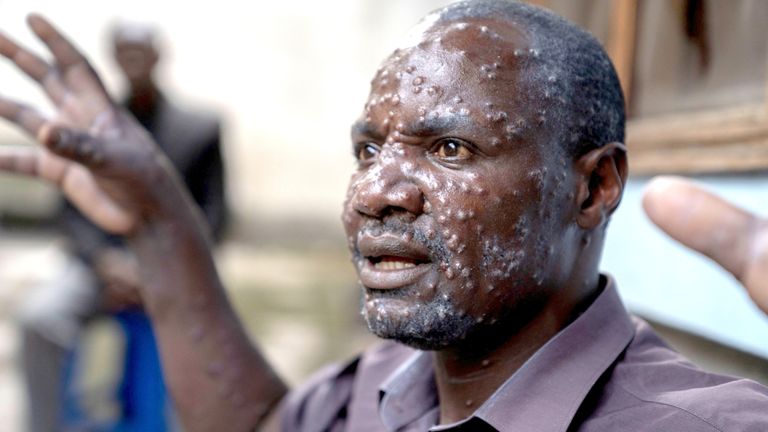Mathatisi Sebusi
MINISTER of Health Selibe Mochboroane says government is making concerted efforts to protect Basotho against the Mpox-virus.
This, Mr Mochoboroane says, is being done by increasing the country’s preparedness to respond to the virus should it invade Lesotho.
Mr Mochoboroane spoke during the National Assembly’s Tuesday afternoon sitting.
He said Lesotho’s preparedness to respond to the disease currently stood at 46 percent compared to Africa’s 52 percent.
While Lesotho had not recorded any case of Mpox, South Africa had already recorded 24 cases of the disease and three deaths this year, in Gauteng, Mpumalanga and Western Cape provinces. Lesotho is completely landlocked by South Africa.
According to World Health Organisation (WHO), Mpox (Monkeypox) is a viral illness caused by the monkeypox virus, a species of the genus Orthopoxvirus.
Common symptoms of Mpox are skin rash or mucosal lesions which can last two to four weeks accompanied by fever, headaches, muscle aches, back pain, low energy, and swollen lymph nodes.
WHO states: “Mpox can be transmitted to humans through physical contact with someone who is infectious, with contaminated materials, or with infected animals. Mpox is treated with supportive care. “Vaccines and therapeutics developed for smallpox and approved for use in some countries can be used for Mpox in some circumstances. It can be prevented by avoiding physical contact with someone who has Mpox. Vaccination can help prevent infection for people at risk.”
Between 2022 and 2023, a global outbreak of Mpox was caused by a strain known as Clade IIb, the WHO said.
Meanwhile, Mr Mochoboroane said the upsurge of Mpox cases worldwide had been announced as a Public Health Emergency of International Concern (PHEIC) by WHO Director General, Dr Tedros Adhanom Ghebreyesus. He, however, added that Lesotho was moderately vulnerable to the disease.
The minister further told the House that the Ministry of Health would receive recommendations from WHO, on how to deal with the disease, that would soon be announced. These would help the country to prepare beforehand in case the disease invaded Lesotho.
He further noted that his ministry was in partnership with other government ministries, to map the way forward on how the country could better address this medical emergency.
“The ministries reviewed the country’s vulnerability to Mpox. It was established that Lesotho’s vulnerability to the disease is moderate. Also, during the meeting, the parties also assessed the country’s preparedness in case it is affected by the disease. In that case, it was found that our preparedness is at 46 percent which is lower than that of the African region at 52 percent,” Mr Mochoboroane said.
The ministries, he said, would soon finalise an emergency strategic plan aimed at addressing the disease. Information tools on the disease aimed at informing and educating the public about the virus, he said, had been finalised and distributed to all districts, health centres and different border posts.
Mr Mochoboroane said 200 health workers had been drilled on the disease for them to be able to diagnose and treat it immediately.
Mr Mochoboroane also told the National Assembly that Lesotho’s partners in the health sector had been informed about the status of the disease in the country and its plan to fight it.
“South Africa has recorded 24 cases of Mpox to date. Basotho travelling outside of the country should be vigilant and observe ministry of health guidelines in countries they are travelling to, to avoid contamination and transmission of the disease,” he said.
For her part, All Basotho Convention (ABC) proportional representation (PR) legislator, Dr Pinki Manamolela, a former Minister of Health under ex-premier Thomas Thabane’s 2012-2015 coalition administration, advised that it would be wise for Lesotho to “strengthen prevention measures”, warning the country “might crumble under the disease if we do not approach it carefully”.
She encouraged the Ministry of Health to “apply for funding as soon as possible” before Lesotho “records any case of Mpox”. Should there be an outbreak in Lesotho, “the country would still be able to implement its prevention strategy”, she said.
AFRICA CDC
On Aug 13, 2024, the Africa Centre for Disease Control and Prevention (Africa CDC) declared Mpox a public health emergency, acting under its mandate to address significant public health threats. This mandate was established in July 2022, by the Executive Council of the Africa Union (AU) Assembly, empowering the Africa CDC to coordinate responses to epidemics by mobilising African leaders, governments, and relevant agencies.
Since 2022, 40 874 cases and 1512 deaths have been reported across 15 AU member states. In 2024 alone, 17 541 cases and 517 deaths have been reported from 13 AU member states.
The Democratic Republic of the Congo (DRC) accounts for 96% of all cases and 97% of all deaths reported in 2024.
Investigations in the DRC suggest that heterosexual transmission, especially among female sex workers is driving the outbreak. The high prevalence among women raises concerns about vertical transmission risks and adverse pregnancy outcomes.
The high risk of severe infection among people living with HIV, considerations for asymptomatic infections, poor vaccination strategies, limited access to medical countermeasures, and low detection rates were other concerns.
Cross-border movements, low public awareness, high vulnerability due to factors such as HIV and malnutrition, limited understanding of Mpox transmission, and insufficient response capacities, including vaccine shortages, pose significant challenges to containment. The risk of Mpox spreading to neighbouring countries and globally is high.
Since the virus was first discovered in 1958 and the first case was reported in the Democratic Republic of the Congo (DRC) in 1970, Mpox has mainly been considered a zoonotic disease in the forested areas of Central Africa, causing limited epidemics in rural areas.
In August 2024, Africa CDC declared the ongoing Mpox outbreak a PHEIC, marking the agency’s first such declaration since its inception in 2017.
This decision highlights the severity of the outbreak.


